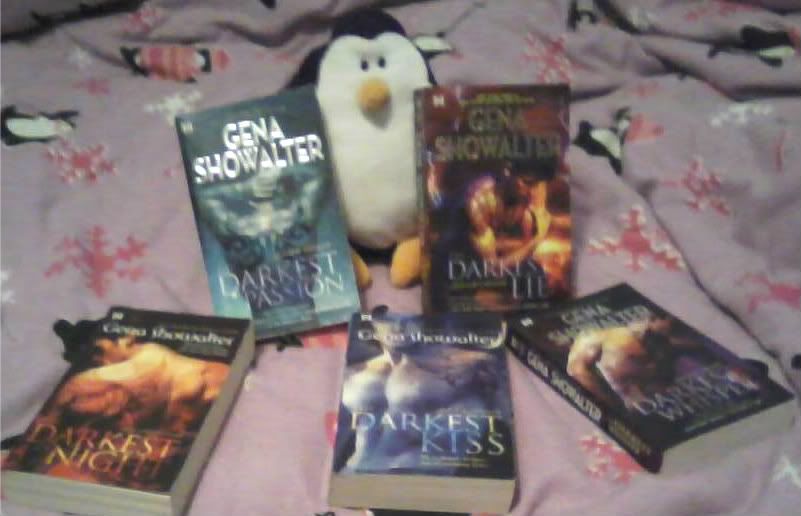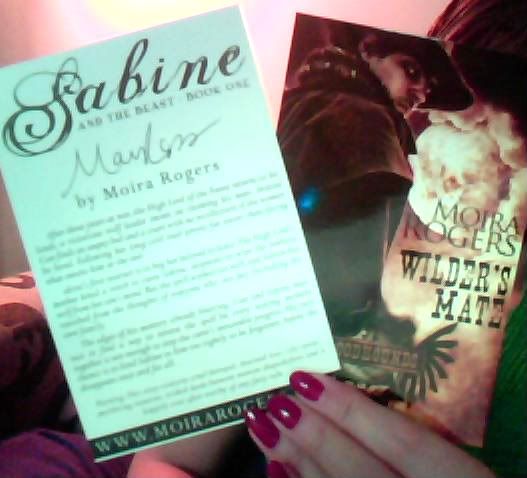Miss Rosemary Glacier has at long last accepted her existence as a rare pink penguin. Most of the other penguins are black and white, and pink is a most conspicuous and unexpected quality in a penguin. For a long time she refused the acknowledge her condition, insisting that she had merely eaten too many strawberries and would return to "normal". But over time, and through many tribulations it became obvious that pink was the way she would always be, and so she accepted all of the special powers and privileges that went with it.
Rosemary, and most of the Council of Pink, insisted that they were alone in their uniqueness and that all other penguins must of course be black and white. Until Rosemary was contacted unexpectedly by a green penguin, known simply as Pickles.
...Which of course must lead her to wonder what other kinds of penguins might be out there.
Something similar happens to Elena in
Stolen by Kelley Armstrong. In
Bitten
, the first book, Elena takes steps toward accepting herself as a werewolf and her place in her pack. Then in
Stolen she is contacted by a witch, who explains to her that there are in fact many types of supernatural creatures and that they require her help.
Now,
Bitten is easily my favorite shapeshifter book, and ranks pretty highly among fantasy books overall. First and foremost, this is because it has such a strong female narrator who's story evokes empathy in a way that few others in the genre manage. Secondly, because it addresses everything associated with being a werewolf--from blood-lust to pack structure--on a very personal level. And finally, because Armstrong addresses Elena's relationships, romantic and otherwise, with so much honesty and realism. Given all of this, it might seem like
Stolen has impossibly big shoes to fill. How does it measure up? SPOILERS AHEAD!
Well, as I said this book is still focused on Elena. So it has the advantage of her wit, sarcasm, toughness, and deeply buried emotions that surface unexpectedly. In the books initial chapters I thought I just might be in for a pleasant surprise, because not only did we have Elena and her fantastic supporting cast--namely Clay and Jeremy--but a whole new intriguing group of characters. Paige the witch, and her Aunt Ruth, invite the werewolves to a council of supernatural creatures to address the recent kidnappings of many of their kind. Turns out there are also half-demons, shamans, vampires, and...who knows what else. The werewolves are naturally unaccustomed to playing nice with others, and so it doesn't exactly go perfectly.
In any case, if the opening was a treat of paranormal politics and character establishment, the middle was a kind of torture. Elena is kidnapped and it quickly devolves into a capture/escape story. Which brings me to my main complaints. The kidnappers seem to want the supernatural beings in order to study them (among other things). This happens often enough in urban fantasy that I'm starting to think that Murdered by Evil Scientists in Research Related Endeavors must rank somewhere in the top 10 causes of death for supernatural creatures. For her part, Elena spends her time in captivity feeling kind of sorry for herself, meeting the researchers and other captives, and half-assedly thinking up escape plans. I was very bored by this process.
Then there's the none to subtle nod to
The Most Dangerous Game 
. Ty Winsloe, the money behind the research operation, has a thing for hunting supernatural creatures. I had an itch in my brain telling me that I'd read something like this before and I realized that Keri Arthur did her own version of "werewolves= the most dangerous game" in her book
Dangerous Games
. Note: I'm fairly certain
Dangerous Games was published after
Stolen. Regardless of this, while I have to acknowledge that being hunted like prey (or even doing the hunting) does make for an exciting plot line, it isn't the most original thing in the world and it didn't add much to this book.
Now, I'm fairly certain that this capture/rescue research facility plot was designed to force the various supernatural creatures to work together. I can respect that and I admit that I enjoyed it. In fact, the last several chapters in which everyone's strengths and powers are utilized in a team setting is fantastically well done.
In sum, this was a book with a very strong start and a satisfying ending, but a pretty lackluster middle. It was extremely difficult to assign it a grade. It doesn't at all compare with
Bitten and if I were to rate it based on that comparison it would be pretty low. It lacks all of the things that made
Bitten great--the pack dynamics, the romantic conflict, all of the character development. But ignoring this comparison it actually is worth reading. All things considered I'm giving it a 3.5.












